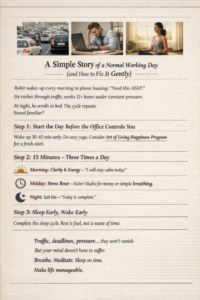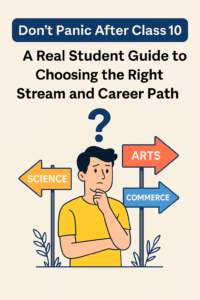Choosing Your Path After School

The final bell has rung, the exams are over, and a new chapter is about to begin. Exciting, right? Absolutely! But also, a little daunting. You’re probably juggling exam stress with daydreams about college life and your future. What’s next? This article is here to help you navigate this crucial decision. No jargon, just simple, straightforward advice to help you make the best call for your future. Choosing a career path is one of the most significant decisions you’ll make in your life, and it’s essential to approach it with careful consideration and self-reflection.
Thinking Primary and Secondary Careers:
Let’s talk strategy. Think in terms of primary and secondary careers. A primary career is your main focus, the one that will ideally provide your livelihood and long-term stability. It’s the foundation upon which you build your professional life. A secondary career can be a passion project, a side hustle, or something you pursue more seriously later on. It’s a way to explore other interests, generate additional income, or simply enjoy a hobby. For many, the secondary career becomes the primary career later in life.
Three Paths to Consider:
There are generally three main avenues to explore:
- Job: Working for an organization, using your skills and knowledge to contribute to their goals. This is the most common path, offering structure, a steady income, and opportunities for professional growth within a defined framework. Jobs are available in countless industries, from technology and finance to healthcare and education.
- Business: Starting your own venture, taking on the risks and rewards of entrepreneurship. This path requires a strong entrepreneurial spirit, resilience, and a willingness to embrace uncertainty. You’ll be your own boss, making your own decisions, but you’ll also be responsible for all aspects of your business, from product development and marketing to finance and customer service. This could be a family business, where you inherit an existing enterprise, or a brand new idea you bring to life, creating something innovative and impactful.
- Your Own Thing: This is for the innovators, the ones with a unique vision and the drive to create something new. It might not fit neatly into a traditional job or business model. This could involve freelancing, consulting, creating online content, developing apps, or pursuing any other passion that allows you to leverage your skills and talents in a unique way. This path often requires a high degree of self-discipline, creativity, and adaptability.
The Allure of Government Jobs:
In India, government jobs hold a special appeal. They often offer excellent job security, benefits, and even pensions that extend beyond your working years. This stability can be a significant factor when considering your long-term plans, especially in a competitive job market. Government jobs are available at various levels, from administrative and clerical positions to highly specialized roles in fields like engineering, medicine, and law. The selection process often involves competitive exams, testing your knowledge and skills in relevant areas.
The Power of Arts and Sports:
Do you have a passion for singing, painting, or a particular sport? These can be fulfilling career paths, but they often require significant dedication, talent, and perseverance. The arts and sports are highly competitive fields, and success often depends on a combination of natural ability, hard work, and networking. While you’re building your skills and reputation in the arts or sports, it might be wise to have a more stable “mainstream” career as your primary focus. Think of it as supporting your dream until it takes flight. This allows you to pursue your passion without undue financial pressure. Many successful artists and athletes started by pursuing their passion as a hobby or side hustle while working in a more traditional job.
Understanding Yourself: The First Step (Expanded)
Before diving into specific careers, it’s essential to understand yourself. This involves a deep exploration of your interests, skills, values, and aspirations. Ask yourself these key questions, and take the time to reflect on your answers:
- What am I passionate about? What subjects do I enjoy in school? What activities make me lose track of time? What do I do for fun? Passion fuels dedication and makes the journey more fulfilling. It’s much easier to excel in a career that you genuinely enjoy.
- What are my strengths and weaknesses? Be honest with yourself. What am I good at? What am I not so good at? What do other people say I’m good at? Knowing your strengths will guide you towards careers where you can excel, while acknowledging your weaknesses will help you identify areas where you might need to develop your skills.
- What are my values? What is important to me in a career? Job security? Helping others? Creative expression? Work-life balance? Your values will influence your career satisfaction. If you value job security, for example, you might be drawn to more stable industries or government jobs. If you value creativity, you might consider careers in the arts or design.
- What kind of lifestyle do I envision? Do you prefer a 9-to-5 job or something more flexible? Do you want to travel extensively or stay close to home? Do you prefer working independently or as part of a team? Your desired lifestyle should align with your career choice. For example, if you value work-life balance, you might consider careers that offer flexible hours or remote work options.
Exploring Career Streams (In Detail):
Let’s look at some popular career paths and what they entail, expanding on the previous descriptions:
- Engineering: A broad field with specializations like computer science, mechanical, civil, and electrical. Requires strong math and problem-solving skills. India has numerous engineering colleges, including IITs and NITs, but competition is fierce. (Reference: NIRF rankings for engineering colleges). Computer science engineering is currently a high-demand field, with opportunities in software development, data science, and artificial intelligence. Mechanical engineering focuses on the design and manufacturing of machines and systems. Civil engineering deals with the design and construction of infrastructure projects. Electrical engineering involves the design and development of electrical systems and devices.
- Medicine: A noble profession requiring dedication and empathy. MBBS is the most common path, followed by specialization. NEET is the entrance exam for medical colleges in India. (Reference: MCI – now NMC – regulations). Becoming a doctor requires years of rigorous study and training. It’s a demanding but rewarding career, offering the opportunity to make a real difference in people’s lives. Specializations include cardiology, oncology, surgery, pediatrics, and many others..
- Finance and Accounting: This field offers diverse career options, including Chartered Accountancy (CA), financial analysis, investment banking, and more. Financial Considerations: Finance careers can be lucrative, but they often require specialized education and certifications.
- Chartered Accountancy (CA): A highly respected professional qualification in India, requiring rigorous exams and articleship. Financial Considerations: Becoming a CA involves significant time and effort, but the rewards are substantial, with CAs in high demand across various industries. The cost of coaching and study materials should be considered.
- International Certifications (e.g., CFA, CPA, ACCA): These certifications are globally recognized and can enhance career prospects in international finance. Financial Considerations: These certifications can be expensive, but they can significantly boost earning potential and open doors to global opportunities.
- Studying Finance Abroad: Pursuing a finance degree or certification abroad can provide a global perspective and access to international networks. Financial Considerations: Studying abroad can be very expensive, including tuition fees, living expenses, and visa costs. However, it can be a valuable investment for those seeking international careers in finance. Research scholarship opportunities and funding options carefully.
- Music/Arts: Requires talent, creativity, and perseverance. Opportunities exist in performance, teaching, and music production. Consider specialized music schools and universities. (Example: Berklee College of Music has a significant Indian student presence). Careers in the arts are diverse, ranging from performing arts like music, dance, and theatre to visual arts like painting, sculpture, and photography. Success in the arts often requires a combination of talent, training, networking, and self-promotion.
- Sports: Demanding but rewarding for talented athletes. Requires rigorous training and dedication. Opportunities are growing in India with leagues and academies. (Example: National Sports Academies). Sports careers can be physically demanding and often involve intense competition. However, they can also be incredibly rewarding, offering the opportunity to represent your country, achieve personal bests, and inspire others.
- Armed Forces: A challenging and disciplined career offering service to the nation. Requires physical and mental fitness. Various entry routes exist through NDA, CDS, etc. (Reference: UPSC website for details). The armed forces offer a variety of career paths, from combat roles to engineering, medicine, and logistics. It’s a highly disciplined environment that requires physical and mental toughness.
- Government Jobs: Offers job security and opportunities for public service. Requires clearing competitive exams like UPSC, SSC, etc. (Reference: Various government recruitment websites). Government jobs are available at the central and state levels, offering a wide range of opportunities in various departments and agencies. The selection process often involves written exams, interviews, and sometimes physical tests.
Making the Final Choice:
Choosing a career is a personal decision. Don’t be pressured by societal expectations or family preferences. Consider all the factors, including your self-assessment, career exploration, and financial planning. Talk to career counsellors, professionals in the fields you’re interested in, and your family. Ultimately, the decision is yours.
Remember: Your career path is not set in stone. It’s okay to change your mind and explore different options. Lifelong learning is essential, and you can always acquire new skills and knowledge. The most important thing is to choose a path that excites you and aligns with your values. Good luck!






